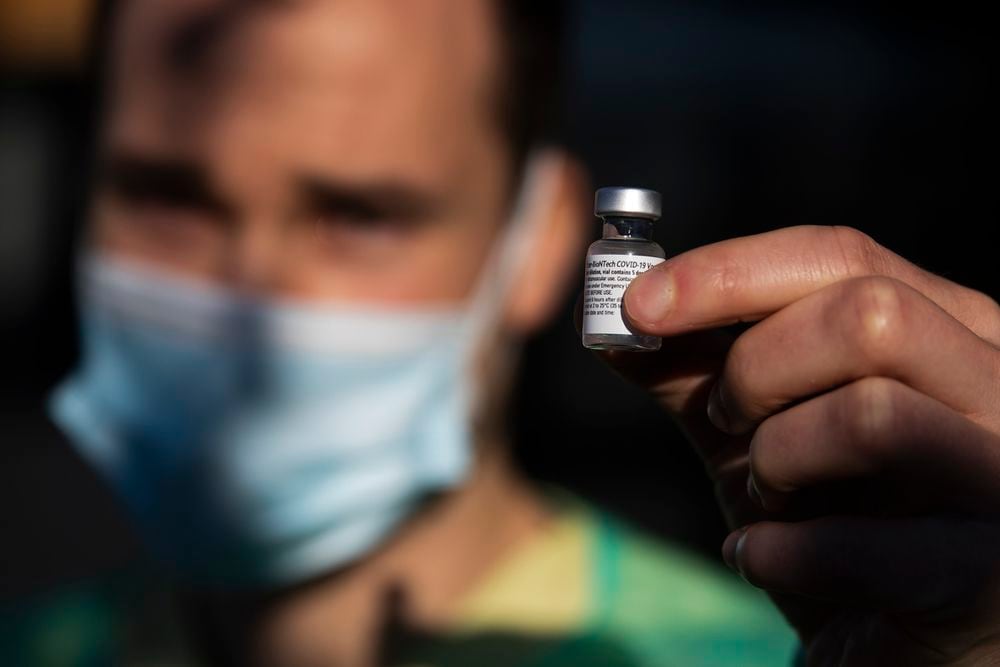The absolute majority won by Alberto Núñez Feijóo in Galicia has allowed the reform of the Galician Health Law, approved this Tuesday in the regional Parliament with the only votes of the PP.
The new health regulations will allow to sanction with fines of up to 60,000 euros to people who refuse to be vaccinated against covid and against possible future viruses.
The new law has the rejection of the opposition groups (BNG and PSOE) and the central government.
The Ministry of Health ensures that "like the rest of vaccinations in Spain, the vaccine against covid-19 is not mandatory."
The reform of the Health Law has been urgently promoted by the PP and not by the Xunta de Galicia, which would require mandatory reports to do so.
A fact that for the opposition groups shows that the PP group led by Feijóo has wanted to "avoid legal reports."
The rule also imposes other sanctions, such as a fine for not wearing a mask, which is set at a minimum of 100 euros, with the possibility of an increase depending on non-compliance.
And among other minor infractions are also making a bottle, breaking curfews, meetings with more people than allowed, participating in parties that violate the measures approved by the health authorities and non-compliance with local hours.
Nationalists and socialists have assured that it will not pass the filters of the Constitutional Court because "it violates fundamental rights and contradicts national regulations."
However, in the face of criticism from the opposition, the PP spokesperson, Encarna Amigo, has defended that the norm "meets all legal guarantees and serves to combat the coronavirus."
“This law supposes the suppression of the fundamental rights of Galicians with the excuse of the pandemic.
They want us to see Galicians as suspects when here there are no more problems with vaccines than their scarcity, ”protested the nationalist spokesperson Iria Carreira.
For his part, PSOE deputy Julio Torrado warned that the PP "uses fear to cut rights" using a "dubious legal framework."
In the opinion of Federico de Montalvo, an expert in health law and vice president of the Bioethics Committee of Spain, the measure may be legally binding.
In Spain, compulsory vaccination in situations such as a pandemic has legal backing with the 1986 public health law, which allows measures to be taken that limit individual rights as long as they benefit the majority of the community.
Although there is no mandatory puncture, there are precedents of judicial decisions in which people have been forced to be vaccinated: after a measles outbreak in Granada in 2010, a judge authorized the forced vaccination of children whose parents refused to to be prodded.
In the case of Galicia, according to Montalvo, it would be necessary to interpret whether an autonomous community can apply the obligation, but he believes that the state of alarm gives powers to its governments to impose measures to stop the epidemic.
In any case, he clarifies, here it is not exactly that nobody is forced to be vaccinated, but that a legal support is drawn up to sanction in case someone refuses.
"The measure is not the same as its application," he says.
"In this case, its role rather than coercive would be an incentive," he adds.
In any case, when approving a legal norm, it is not only necessary to observe its legality, but also its timeliness.
“A measure not only has to be adequate and be legally foreseen, but also be necessary, that there is no less coercive alternative that allows me to achieve the same end.
And it is not necessary unless in Galicia there is a specific context of rejection of immunization, ”continues Montalvo.
According to the latest CIS barometer, more and more citizens are willing to get vaccinated as soon as they can.
82.9% of those surveyed are willing to do so, 10.4 points more than a month ago (72.5%).
The percentage doubles those who answered affirmatively in December (40.5%), days before the injections began in Spain.



/cloudfront-eu-central-1.images.arcpublishing.com/prisa/L4VA3NCNWNAZVOQ7YFDOKLJECA.JPG)



